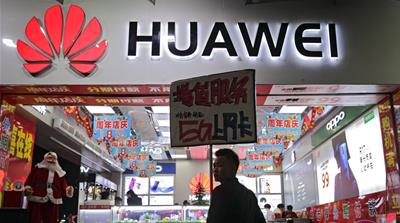
The founder of Chinese tech giant Huawei said on Tuesday that his company would refuse to disclose secrets about its customers and their communication networks, trying to lay to rest concerns the company might spy for Beijing.
Ren Zhengfei spoke in a rare meeting with foreign reporters as Huawei Technologies Ltd tries to protect its access to global telecom carriers that are investing heavily in next-generation technology.
Ren’s comments were the most direct public response to accusations that his company is controlled by the ruling Communist Party or is required to facilitate Chinese spying.
Huawei, the biggest global supplier of network equipment used by phone and internet companies, is China’s first global tech brand. The United States, Australia, Japan and some other governments have imposed curbs on the use of its technology over concerns raised by the accusations against the company.
“We would definitely say no to such a request,” Ren said when asked how the company would respond to a government demand for confidential information about a foreign buyer of its telecom technology.
Huawei is facing heightened scrutiny as phone carriers prepare to roll out fifth-generation technology in which Huawei is a leading competitor. 5G is designed to support a vast expansion of networks to serve medical devices, self-driving cars and other technology.
That increases the cost of potential security failures and has prompted governments increasingly to treat telecoms communications networks as strategic assets.
The company’s image suffered a new blow last week when Polish authorities announced one of the company’s Chinese employees had been arrested on spying charges. Huawei announced that it had fired the employee and said the allegations had nothing to do with the company.
Meng Wanzhou’s arrest
Ren is the father of Huawei’s chief financial officer, Meng Wanzhou, who was arrested on December 1 in Canada on US charges related to possible violations of trade sanctions on Iran.
Ren said he couldn’t discuss the pending case but did say that Huawei obeys the law, including export restrictions, in every country where it operates.
Ren expressed gratitude to Canadian justice officials for their treatment of Meng, who was released on bail and is staying in a house in Vancouver. He also expressed appreciation to her fellow jail inmates prior to her release “for treating her kindly”.
“After all the evidence is made public, we will rely on the justice system,” he said. “We are sure there will be a just conclusion to this matter.”
Two Canadians were arrested by Chinese authorities on national security charges, prompting suggestions abroad they might be hostages to secure Meng’s release. On Monday, a Chinese court sentenced a Canadian to death in a drug case after a sudden retrial was ordered in his case.
Asked whether he felt that Huawei was linked to accusations Beijing took hostages, Ren said he saw no connection between the Canadians and Meng’s case.
Decisions based on customer’s needs
 |
| Huawei is counting on 5G to expand its business operations throughout the world [Andy Wong/AP Photo] |
Ren said he became a Communist Party member in the early 1980s after the state press published reports about his development of a measuring tool for an engineering project.
Ren founded Huawei in 1987 to sell imported telecom switching gear to Chinese phone companies after the People’s Liberation Army disbanded his engineering unit, according to the company.
Ren said that despite his party membership, Huawei makes decisions based on its customers’ needs.
“I don’t see a close connection between my personal political beliefs and our commercial decisions,” he said.
Although the company has been blocked from operating in the US since 2012 when legislators said the company could pose an intelligence threat, it is a lucrative company. Huawei says it expects last year’s revenue to exceed $100bn for the first time. Ren said this year’s target is $125 bn.
Huawei says it is employee-owned. Ren said no government entity or any other investor who isn’t a current or former employee owns “once cent of Huawei shares”.
Ren said Huawei has no research cooperation with the ruling party’s military wing, the PLA. He said the company has no dedicated unit for military sales and he knew of no purchases of civilian technology by the PLA.
Ren cited comments by Chinese government spokespeople who rejected suggestions, including by a vice president of the European Union, that Chinese vendors might be required to install secret “backdoors” to facilitate eavesdropping under a law enacted last year that requires them to cooperate with intelligence agencies.
Ren said Huawei doesn’t want Beijing to retaliate for foreign restrictions by hampering market access for Apple Inc and other rivals.
“In spite of setbacks in some countries, we are still supportive of China becoming a more open country,” he said.












